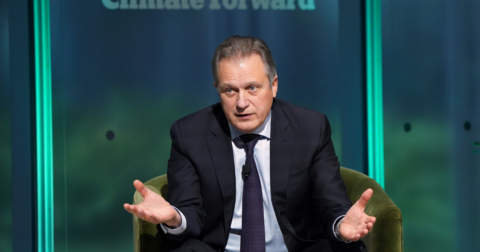Feature
Cattle Raised for Beef Are Heavier Than Ever, Raising New Concerns in the Industry About Animal Health and Welfare
Food•2 min read
News
Advocacy groups asked regulators to block JBS’ bid, noting its history of corruption charges and illegal deforestation. Approval came after a big donation to Trump.


Words by Georgina Gustin, Inside Climate News
This article originally appeared on Inside Climate News, a nonprofit, non-partisan news organization that covers climate, energy and the environment. Sign up for their newsletter here.
The world’s largest meat company, Brazil-based JBS, has sought a listing on the New York Stock Exchange for more than a decade, but the company, which has long been accused of links to illegal deforestation in the Amazon, was stymied by corruption charges.
On Wednesday, the U.S. Securities and Exchange Commission greenlighted the listing, despite the company’s history. The move, critics say, could hamper efforts to slow the destruction of the world’s largest rainforest, a crucially important ecosystem that’s essential for stabilizing Earth’s atmosphere.
“Our fear is that getting access to U.S. capital markets will allow JBS to supersize their deforestation and methane pollution,” said Glenn Hurowitz, CEO of the advocacy group Mighty Earth, which has campaigned against the listing and has long tracked JBS’ environmental impacts. Mighty Earth has called the listing “the biggest climate risk IPO in history.”
The decision by the SEC, advocacy groups note, came days after campaign filings revealed that one of JBS’ subsidiaries, the chicken producer Pilgrim’s Pride, donated $5 million to President Donald Trump’s inauguration campaign—the largest of any single company.
“This listing is clearly a huge financial deal for JBS, and Trump has given them a political environment of the type in which they’re very used to operating,” Hurowitz said.
Since Trump’s inauguration, the U.S. Department of Agriculture announced a loosening of regulations on poultry processors that would allow them to increase processing speeds—a move long sought by the industry.
In a separate matter, Pilgrim’s Pride, a public company traded on the Nasdaq exchange, agreed in January to pay $41 million to address charges that it artificially inflated its stock prices.
The SEC declined to comment on an “individual company or filing.” According to a description of its review process, the SEC “does not evaluate the merits of any transaction or determine whether an investment is appropriate for any investor.”
Until recently, the SEC pushed back on JBS’ attempts to list on the world’s largest stock exchange as lawmakers and advocacy groups worked to block the company. In the waning months of the first Trump administration, the commission and the Department of Justice fined JBS, along with its parent company, J&F Investimentos, and Joesley and Wesley Batista—the brothers who control most of the company—a total of $280 million after determining they had bribed roughly 1,800 Brazilian officials, in part to facilitate JBS’ acquisition of Pilgrim’s Pride.
“Engaging in bribery to finance their expansion into the U.S. markets and then continuing to engage in bribery while occupying senior board positions at Pilgrim’s reflects a profound failure to exercise good corporate governance,” wrote Charles Cain, chief of SEC enforcement for the Foreign Corrupt Practices Unit. “This brazen misconduct flies in the face of what investors should expect from those occupying the role of an officer or director of a U.S. issuer.”
The company has also been accused of misleading investors about its climate commitments and fraudulently issuing “green” bonds attached to its greenhouse gas reduction targets.
The company has submitted applications with the SEC beginning in 2009, when its U.S. unit filed for an initial IPO. In 2023, the company resubmitted its most recent application, following up with several more submissions over the past two years.
“We’ve not seen JBS take any remotely sufficient actions to clean up the corruption or the climate misreporting that would justify alleviating the SEC’s stated concerns. The only thing we can see is a really huge donation,” Hurowitz said. “JBS is a company that, seemingly, can’t stop lying.”
JBS did not respond to questions and a request for comment. “We believe this transaction will increase our visibility in global markets, attract new investors, and further strengthen our position as a global food industry leader,” said Gilberto Tomazoni, the company’s CEO, in a press release. The company expects to begin offering shares in the U.S. market in June.
Environmental groups and government regulators have long accused JBS of human rights violations, illegal grabs of Indigenous lands, using child labor and sourcing its cattle from illegally deforested land in the Amazon rainforest. The Batista brothers were accused by Brazilian authorities of bribing lawmakers after a government investigation that was called the “largest corruption inquiry in history.” J&F Investimentos, the controlling shareholder in JBS, initially agreed to pay $3.2 billion in fines, but the Brazilian Supreme Court ultimately knocked off $2.1 billion in a leniency deal.
Researchers have calculated that the company’s 2021 greenhouse gas emissions, mostly connected to deforestation and methane, are equivalent to the total emission from Spain, and its cattle business is estimated to have caused deforestation on 4.2 million acres.
The SEC listing could open the door for more destruction and climate harms, advocacy groups say.
JBS has argued the dual listing the company applied for—on both the Brazilian and New York stock exchanges—would invite more shareholder scrutiny and represent a positive opportunity for better shareholder governance. But the restructuring process proposed by the company would increase the voting power of the Batista family—the controlling shareholders—from about 48 percent to nearly 85 percent, advocacy groups say.
“JBS has argued that this would improve their governance and transparency, but what it actually does is place voting rights in the hands of one family,” said Alexandria Reid, a strategist with Global Witness, an advocacy group. “Because of the ways the vote is structured and the consolidation of voting rights … this deal really does limit the ability of investors to exert pressure on the company on climate or human rights-related matters.”
The company has promised to end illegal deforestation in its supply chains by the end of 2025 and reach net-zero emissions by 2040. But it has also said it plans to expand its business, which environmental researchers say is entirely incompatible for an operation that relies on methane-belching cattle that graze on deforested land or are fed grains grown on deforested land.
In February 2024, New York Attorney General Letitia James filed a lawsuit against JBS, accusing it of misleading the public with its climate-focused claims.
“Its plans to expand and its environment-wrecking business model should have no place in the public market,” said Daniela Montalto, a campaigner with Greenpeace UK. “The fact that a company like JBS would be able to list on the New York Stock Exchange is truly bad news. Their expansion plans throw any climate goals out the window. We’re talking about a company with a history of corruption and environmental destruction, but also a growth strategy that is committed to the meat sector.”
JBS will hold a shareholder meeting to vote on the SEC’s approval on May 23. Minority shareholders will have the decisive vote in determining whether to move ahead with the listing, but the restructuring will dilute the voting rights of minority shareholders going forward, critics say. If the vote is successful, JBS will be owned by a new holding company, JBS N.V., based in the Netherlands, where companies seek tax exemptions under Dutch law.
If its shareholders approve the listing, JBS will be able to access major investment funds regulated by the SEC.
Recent research has suggested that the Amazon rainforest is under increasing stress from drought, heat and wildfires, threatening its status as a crucial atmospheric carbon sink. One of the biggest drivers of fire is forest-clearing for agriculture, which intensifies drought and makes forests more vulnerable to fire.